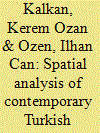| Srl | Item |
| 1 |
ID:
145630


|
|
|
|
|
| Summary/Abstract |
This article aims to analyze the dynamics of the party system in Turkey by focusing on the AKP and construct an aggregate-level analysis of the electoral environment it operates in using regression models (1950–2011). Findings show strong patterns of continuity in the electoral geography of Turkey since the 1970s, mapping electoral strongholds of center-right, ultra-nationalist and pro-Islamist parties compared to those of the AKP. As of 2015, the AKP seems to have achieved a great deal of stabilization electorally and there is now handful of data that can identify and answer some of the questions related to the AKP, especially regarding its ideology, origins, electoral strength and appeal.
|
|
|
|
|
|
|
|
|
|
|
|
|
|
|
|
| 2 |
ID:
145638


|
|
|
|
|
| Summary/Abstract |
Turkish politics is complex and, at times, comes close to being bizarre. When the Justice and Development Party (Adalet ve Kalkınma Partisi [AKP]) came to power it embarked on ambitious economic and political reforms that at last promised to bring embedded democracy to Turkey. Yet, since 2007, most of the initial reforms have regressed, deepening societal cleavages that threaten the stability of the country, and a popularly elected president threatens to change the parliamentary democratic system with an autocratic presidential order. While the AKP can celebrate in its unprecedented four election victories since 2002, its recent actions should give concern to anyone who cares about the future of Turkey.
|
|
|
|
|
|
|
|
|
|
|
|
|
|
|
|
| 3 |
ID:
142293


|
|
|
|
|
| Summary/Abstract |
The academic literature on negative campaigning is growing. As an attempt to contribute to the theoretical and empirical knowledge on the phenomena, this study focuses on the Turkish elections and tries to provide answers to the following research questions: What is the level of negativity in Turkish electoral campaigns and which factors are salient for going negative for Turkish political parties? Findings display the fact that negativity is noticeably high in Turkey, and incumbency, ideology and time focus of messages are salient factors for negativity.
|
|
|
|
|
|
|
|
|
|
|
|
|
|
|
|
| 4 |
ID:
152455


|
|
|
|
|
| Summary/Abstract |
This study offers a comprehensive approach to spatial analysis of parliamentary elections in Turkey since 2002. Using advanced spatial models, we find that electoral competitiveness and concentration mostly stabilized in the Western subprovinces whereas they are still in flux in the Eastern and Southern regions. There is an increasing level of geographically dependent concentration and competitiveness in recent elections, particularly in the 2015 elections (June and November). Our analyses also show that while the ruling AKP party has become the party of all regions, its competitors (CHP, MHP, and HDP) exhibit a narrowing geographical appeal.
|
|
|
|
|
|
|
|
|
|
|
|
|
|
|
|
| 5 |
ID:
145642


|
|
|
|
|
| Summary/Abstract |
After examining the causes of Turkey's failure to help secure a benign environment in its neighborhood during and after the so-called Arab Spring, this article tries to answer how foreign policy dynamics played a role between the two parliamentary elections in Turkey held in June and November 2015 respectively. Another question is whether foreign policy developments taking place in Turkey's neighborhood, particularly in the wider Middle Eastern region, will drive Turkey closer to its Western partners in the post-election era. Whether Turkey's rediscovery of the Western international community will be long-term or conjectural development, given its growing security challenges, warrants a closer attention.
|
|
|
|
|
|
|
|
|
|
|
|
|
|
|
|